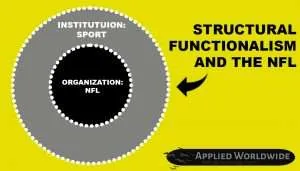American football is one of the most popular sports in the world, and the National Football League (NFL) is its premier professional league. The NFL is a multi-billion dollar industry that employs thousands of people and generates billions of dollars in revenue each year. So, let’s take a look at structural functionalism and the NFL.
Structural functionalism is a sociological theory that examines how social structures and institutions contribute to the overall stability and functioning of society. Structural functionalists believe that all social structures and institutions serve important functions, and that they are all interconnected.
In this blog post, we will examine American football and the NFL from a structural functionalist perspective. We will discuss the various social structures and institutions that are involved in American football, and we will explain how they contribute to the overall stability and functioning of society. To see our previous analyses of the sociology of the NFL click the links below!
- The Sociology of the NFL Draft
- Sociology of the National Football League
- Black National Anthem: The NFL to End Racism
Structural Functionalism and the NFL: The Social Structures and Institutions of American Football
American football is a complex sport that involves a variety of social structures and institutions. These include:
The NFL
The NFL is the governing body of professional American football in the United States. The NFL is responsible for setting the rules of the game, scheduling games, and determining the champion.
The NFL has its own staff including its lead representative, the commissioner. These employees are independent of any individual team.
NFL teams
NFL teams are the organizations that compete in the NFL. Each NFL team has a roster of players, a coaching staff, and a front office staff. Even at the individual NFL team level, we are talking about multibillion dollar organizations.
As of writing this article, the going rate for an NFL team is around 5 billion dollars. But, even if you have the cash on hand, it can be a tough crowd to get into because in addition to the physical capital, you will need approval of the other team owners so some social capital is necessary as well.
Nevertheless, each NFL team, while its own entity, must operate in accordance with the NFL’s regulations in order for the entire structure to function properly.
College football
College football is the amateur form of American football that is played in the United States. College football teams compete in various conferences and divisions, and the best teams advance to the college football playoffs.
College football also serves as the primary feeder league for athletes to get to the NFL. Through the NFL Draft process, NFL teams get to select the most promising athletes from college football to join their teams in the NFL. The actual rules of drafting players from college are once again regulated by the NFL corporate office. In this process the teams with the worst records from the previous year get the first selection of college athletes, while the best teams wait.
Once again this process is regulated in such a way that is supposed to keep order and structure in place. The idea is for parity where any NFL team can win a championship in any year.
How American Football and the NFL Contribute to the Stability and Functioning of Society
Structural functionalists believe that all social structures and institutions serve important functions, and that they are all interconnected. American football and the NFL contribute to the stability and functioning of society in a number of ways, including:

Providing entertainment and recreation
American football is a popular form of entertainment and recreation for millions of people around the world. Watching football games, attending games in person, and playing fantasy football are all popular ways for people to relax and have fun.
Promoting social cohesion
American football is a unifying force in American society. People from all walks of life come together to cheer on their favorite teams and to celebrate their shared love of the game.
Teaching important life skills
American football teaches players important life skills such as teamwork, discipline, and work ethic. These skills are valuable in all aspects of life, from school and work to personal relationships.
Generating economic activity
American football is a major economic engine in the United States. The NFL employs thousands of people and generates billions of dollars in revenue each year. This revenue supports a variety of industries, including sports broadcasting, sports tourism, and sports merchandise.
Additional Perspectives of Structural Functionalism and the NFL
In addition to the general points discussed above, there are a number of other structural functionalist perspectives on American football and the NFL. For example, structural functionalists might examine how American football:
- Provides a sense of community and belonging: American football can provide a sense of community and belonging for people from all walks of life. Fans of a particular team may identify with that team and its players, and they may feel a sense of camaraderie with other fans of that team.
- Promotes social values: American football can promote social values such as teamwork, discipline, and fair play. These values are important for the smooth functioning of society, and they can be taught through American football.
- Serves as a safety valve for social tensions: American football can serve as a safety valve for social tensions. People may use American football as a way to express their frustrations and anger in a safe and controlled environment. This can help to prevent social tensions from escalating into violence.
Critiques of Structural Functionalist Perspectives on American Football and the NFL
Some people have critiqued structural functionalist perspectives on American football and the NFL. One common critique is that structural functionalism is too conservative and that it ignores the potential negative consequences of American football. For example, critics argue that American football can be a violent sport that can lead to serious injuries and even death. They also argue that American football can be a distraction from more important social problems.
Another common critique is that structural functionalism is too deterministic and that it ignores the role of individual agency. Critics argue that structural functionalists tend to see individuals as passive participants in social structures, rather than as active agents who can shape their own destinies.
Despite these critiques, structural functionalism remains a valuable theoretical perspective for understanding American football and the NFL. Structural functionalists offer a unique perspective on the social and cultural significance of American football, and their insights can help us to better understand the sport and its impact on society.
Final Thoughts on the Structural Functionalism of the NFL
American football and the NFL are complex social phenomena that can be analyzed from a variety of perspectives. Structural functionalism is one such perspective, and it offers a unique way to understand the social and cultural significance of American football. While structural functionalist perspectives have been critiqued for being too conservative and too deterministic, they remain valuable for understanding the sport and its impact on society.







